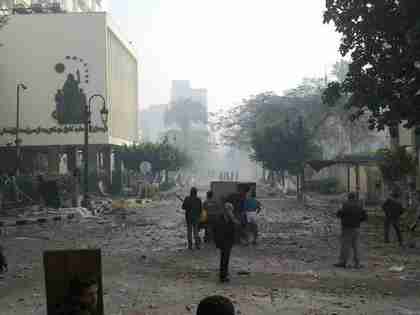This morning’s key headlines from GenerationalDynamics.com.
- Cairo suffers worst violence since election, as army attacks protesters
- China considers a naval base in the Seychelles
- Fitch says a comprehensive euro zone deal is ‘beyond reach’
- Germany expresses doubts about helping the IMF help Europe
- Pakistan commemorates the war that created Bangladesh
Cairo suffers worst violence since election, as army attacks protesters
 The Egyptian Cabinet turned into a war-zone on Friday (Bikya Masr) |
At least five protesters were killed and dozens were injured by the military and security forces in clashes in front of Egypt’s Cabinet building in Cairo on Friday. The military had promised recently not to use violence against peaceful protesters, but those promises were broken. Men in uniform, perched on rooftops, threw sheets of glass, rocks, bottles and even furniture at protesters. “Some of these soldiers gestured obscenely towards the protesters, and one of them even at one point urinated on the protesters below.” Bikya Masr and Al-Jazeera
China considers a naval base in the Seychelles
The Seychelles, a country consisting of 115 small islands off the eastern coast of Africa, is offering China a base for Chinese ships deployed to the Gulf of Aden and the West Indian Ocean, to help combat piracy. Since 2001, China has been pursuing a “String of Pearls” strategy, with ports in Gwadar (Pakistan), Sri Lanka, Bangladesh, and on the east cost of Burma in the Arabian Sea. A Seychelles naval base would allow a broader strategic linkage between the Chinese and Pakistan navies, allowing them to expand a land war with India into a naval war. The Diplomat
Fitch says a comprehensive Euro Zone deal is ‘beyond reach’
While investors are staying happy at holiday parties, and analysts on CNBC and Bloomberg TV and politicians in Washington and Brussels are predicting that prosperity is just around the corner, Europe’s financial crisis continues to worsen. On Friday, Fitch ratings service reaffirmed France’s AAA rating, but said the outlook was negative. That was the good news. The bad news is that Fitch has concluded that, after last week’s failed euro zone summit,
“…A ‘comprehensive solution’ to the euro zone crisis is technically and politically beyond reach. Of particular concern is the absence of a credible financial backstop. In Fitch’s opinion this requires more active and explicit commitment from the ECB to mitigate the risk of self-fulfilling liquidity crises for potentially illiquid but solvent Euro Area Member States.”
It put Belgium, Spain, Slovenia, Italy, Ireland, and Cyprus on negative watch, which could mean a downgrade within three months. On the same day, Moody’s Investors Service cut Belgium’s credit rating by two notches, while Standard & Poors has already warned 15 of the currency bloc’s 17 members they were close to a downgrade. Reuters
Germany expresses doubts about helping the IMF help Europe
Last week’s eurozone summit was largely a waste of time, but it did reach one concrete decision: They vowed to loan up to €200 billion ($260 billion) to the International Monetary Fund so that the IMF could step up its aid to European countries in need. Now, though, with Germany’s Bundesbank (central bank) showing increasing doubts about the fund and others demonstrating an unwillingness to participate, even that measure may now be in doubt. Germany, the biggest potential contributor is indicating that it won’t do so unless members outside of Europe also contibute. Russia has indicated a willingness to contribute, but the U.S., Canada, the U.K and the Czech Republic, among others, have indicated an unwillingness to participate. Spiegel
Pakistan commemorates the war that created Bangladesh
 Indian subcontinent |
Friday was the 40th anniversary of the disintegration of Pakistan. Pakistan was the first state to disintegrate after World War II. What is now called Bangladesh used to be part of Pakistan, and was known as East Pakistan. At that time, a civil war between the East and West Pakistan forces, with the East Pakistanis aided by Indian troops, led to the secession of East Pakistan, and the creation of Bangladesh. The two countries have little in common except the Muslim religion. Bangladesh’s are ethnic Bengali, speaking the Bangla language. Pakistan has several ethnic groups, and the national language is Urdu, though Radio Pakistan broadcasts daily in over 20 languages and dialects. From the point of view of Generational Dynamics, what’s interesting is that the 1971 war was a generational crisis war for Bangladesh — just as the 1949 Partition war was a crisis war for Pakistan. This happens because Pakistan and Bangladesh are on different generational timelines, just as they have different ethnicities and different languages. Daily Times (Pakistan) and Part II
COMMENTS
Please let us know if you're having issues with commenting.